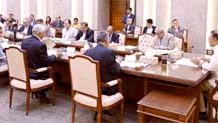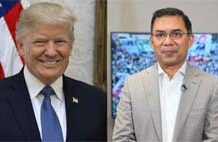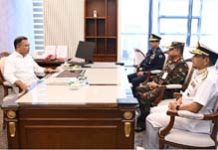C T Online Desk: Education Minister Dr Dipu Moni has said Bangladesh and China can cooperate stronger in policy, infrastructure, trade, financial, and people-to-people connectivity.
“Two countries will work together to push Bangladesh-China relations to a new height,” she said while speaking as the chief guest at the report launching programme on the Belt and Road Initiative in Bangladesh on Thursday night.
Chinese Ambassador to Bangladesh Yao Wen, Additional Secretary and Wing Chief of ERD Md. Anwar Hossain, Executive Member of BIDA Dr. Khandoker Azizul Islam, Secretary General of BCCCI Al Mamun Mridha, Vice President of BGMEA Md. Shahidullah Azim and Economic Reporters Forum President Refayet Ullah Mirdha, among others, were present.
Bangladesh is the first country in South Asia to join the Belt and Road Initiative.
In the past seven years, the Belt and Road Initiative has injected impetus into Bangladesh’s economic growth, and improved the livelihood of Bangladeshi people, said Ambassador Yao.
Looking ahead, the Belt and Road Initiative will continue to unleash strong vitality and become a road of opportunity and prosperity for China and Bangladesh, he said.
On policy connectivity, the leaders of the two countries have provided strong political guidance for China-Bangladesh relations.
On infrastructure connectivity, he said China has built 12 roads, 21 bridges and 27 power and energy projects in Bangladesh, and Chinese companies have created more than 550 thousand jobs in Bangladesh.
In the fourth quarter of this year, the Bangabandhu Sheikh Mujibur Rahman Tunnel, and the first section of the Padma Bridge Railway Link project will be opened to traffic, said Ambassador Yao.
On trade connectivity, he said China has been Bangladesh’s largest trading partner for 12 consecutive years.
Since Bangladesh joined the Belt and Road Initiative in 2016, bilateral trade has grown from 15.3 billion US dollars to 27.8 billion US dollars in 2022, which is the highest in the history.
“China will continue to promote the sustained and balanced development of bilateral trade, expidite the export of mango and other high-quality agricultural products to China,” said the Ambassador.
He said China will also advance the negotiation of free trade agreement with Bangladesh, make good use of platforms such as the CIIE, help diversify Bangladesh’s export market and assist Bangladesh in graduation from LDC.
Ambassador Yao said the Belt and Road Initiative serves as a platform for China to construct the community with a shared future for mankind.
“The Belt and Road Initiative has no gene of seeking hegemony, no tradition of interfering in other country’s internal affairs, and no elements of expansion and plunder,” he said, adding that it can be said that on the journey of Bangladesh’s modernization, the Belt and Road Initiative is most consistent with the “Vision 2041” and “Sonar Bangla” dream and is most suitable for Bangladesh’s reality.
With the guidance of the Belt and Road Initiative, the Ambassador said China-Bangladesh relations will surely reach a new height and open a new era of friendly cooperation.
The stock of Chinese investment in Bangladesh has grown to 1.3 billion US dollars by 2022.
There are more than 670 Chinese companies operating in Bangladesh.
“Just now, I awarded licenses to 16 Chinese companies whose South Asian headquarters are in Bangladesh,” said Ambassador Yao.
He said China will keep encouraging more Chinese companies to invest in Bangladesh. Bangladesh plans to build 100 economic zones across the country, and I believe that many of them will be named after “China”.
On people-to-people connectivity, the Ambassador said over the years, China has provided more than 5000 opportunities for Bangladeshi young people to go to China for training and participate in degree education.
Right now, there have been 50 flights flying between China and Bangladesh every week, and nearly 10 thousand people commute to and from China and Bangladesh on weekly basis, which will tremendously promote personnel exchanges between the two countries, he said.
In the future, Ambassador Yao said, China will provide Bangladeshi friends with more opportunities for training and degree education in China.
Bangladesh Needs Cohesive Policy
Bangladesh needs a cohesive policy framework to harness BRI’s potential fully and engage in projects that align with national development goals, boosting economic activities and facilitating technology transfers, says the report launched Thursday night.
“By strategically leveraging BRI opportunities, Bangladesh can pave the way for transformative and sustainable economic development, addressing challenges with strategic planning and effective implementation,” the report mentioned.
The report titled “The Belt and Road Initiative in Bangladesh: Achievements and Way Forward” in its executive summary laid emphasis on improving business environment with upgradation of power, transportation, and logistics to attract private investments.
To maximise the benefits of the BRI, the report said, Bangladesh should focus on infrastructure and economic activities.
Bangladesh should prioritise infrastructure development like roads, railways, and energy facilities to attract foreign investment and enhance trade competitiveness and efficiency.
The Embassy of China in Bangladesh in collaboration with the Bangladesh-China Chamber of Commerce (BCCCI) and China Enterprises Association Bangladesh (CEAB) published the report.














